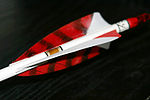Fletching
This article needs additional citations for verification. (February 2014) |

Fletching (also known as a flight or feather) is the aerodynamic stabilization of arrows or darts with materials such as feathers, each piece of which is referred to as a fletch. A fletcher is a person who attaches the fletching.
The word is related to the French word flèche, meaning "arrow", via Old French; the ultimate root is Frankish fliukka.
Description
As a noun, fletching refers collectively to the fins or vanes, each of which individually is known as a fletch. Traditionally, the fletching consists of three matched half-feathers attached near the back of the arrow or dart's shaft that are equally spaced around its circumference. Four fletchings were also used historically. Today, modern plastics may be used instead. Fletches were traditionally attached with glue and silk thread, but with modern glue/thread/tape this is no longer necessary, unless the arrow is a reproduction of a medieval war arrow. The fletching is used to stabilize the arrow aerodynamically. Feather fletches impart a natural spin on an arrow due to the rough and smooth sides of a feather and the natural curve, determined by which wing the feather came from. Vanes need to be placed at a slight angle (called an offset fletch), or set into a twist (called a helical fletch) to create the same effect, but all are there to impart stability to the projectile to ensure that the projectile does not tumble during flight.
More generally, it can refer to any structures added to a projectile to aerodynamically stabilize its flight, many of which resemble arrows in form and function. For instance, the feathers at the butt end of a dart (of the type cast using an atlatl) are very similar in purpose and construction to those used in arrows. Most of the techniques of fletching were likely adapted from earlier dart-making techniques. The fins used to stabilize rockets work in a similar manner.
A Fletcher would be someone who works with and/or makes these.

See also
References
Further reading
- Massey, Jim. (1992). "Self Arrows" in The Traditional Bowyer's Bible Volume One, (Jim Hamm, ed.). Guilford: The Lyons Press. ISBN 1-58574-085-3
- Engh, Douglas. Topic "Arrows" in "Archery Fundamentals". Human Kinetics ISBN 0-7360-5501-0
- Soar Hugh David. Straight and True. a select history of the arrow. Westholme publishing ISBN 978-1-59416-147-6
